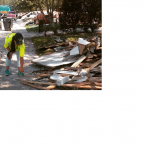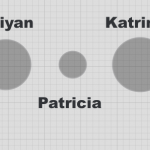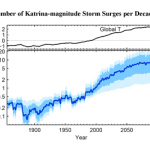Katrina
It’s been nearly a month since Hurricane Harvey made landfall on August 25 off the Gulf coast of Texas. The Houston Chronicle continues its excellent coverage of the massive “clean-up” efforts in cities across the region. Today’s edition features photos and interviews from Dickinson, TX, a town about 30 miles southeast of Houston. More than 7,000 homes in Dickinson were either destroyed or damaged. Officials are telling “weary residents” it’s going to take some time to get all of the debris removed that they’ve placed outside of their houses, apartments, mobile homes.
Jessica Martinez and…
CNN is calling Hurricane Patricia "The Most Dangerous Hurricane in History." Another news outlet showed a picture of the hurricane and pointed out "The Enormous Size of Hurricane Patricia."
Both of these are wrong. Size matters with hurricanes. A category 5 hurricane that is twice as large as another category 5 hurricane is "more dangerous" all else being equal, and by "all else" I mean things like exactly where it hits, how fast it is moving, exactly how strong it is (category 5 includes a very wide range of wind speeds because it is the highest category). Hurricane Patricia is not huge.…
Jeff Masters reports on these studies:
Grinsted, A., J. C. Moore, and S. Jevrejeva, 2012, "A homogeneous record of Atlantic hurricane surge threat since 1923," PNAS 2012, doi:10.1073/pnas.1209542109
Grinsted, A., J. C. Moore, and S. Jevrejeva, 2012, "Projected Atlantic hurricane surge threat from rising temperatures" PNAS March 18, 2013 201209980, doi: 10.1073/pnas.1209980110
There is a press release here.
And apparently this is on top of the effects from sea level rise, of which rises measured by metres are not out of the question. I believe that a 1 cm rise in sea level…
It is time to discuss, once again, the falsehood known as "Hurricane Landfall."
A hurricane is a whopping big thing. A hurricane can be bigger than some states. The physical region across which a hurricane is potentially deadly and damaging is very large, many tens of miles across, sometimes a couple of hundred miles across. The danger zones are often organized like this:
The central storm surge. A central region may have a strong storm surge caused by the low pressure of the storm. This may be dozens of miles wide, but the area of effect is determined as much by the shape of the coastline…
This is interesting. I have mixed feelings about it but it is probably a necessary step in forcing the reality of this issue into the correct legal and political context. Actions have consequences and actors have responsibilities.
The only question I have is that the respnsibility is really shared by all of us as consumers of fossil fuels, in some sense it is not fair to place all the respnsibility on the fossil fuel companies.
Of course when they intentionally create misinformation to avoid addressing the problem, the face a corresponding increase in culpability.
Read it below:
Katrina…
When will the madness end? When the Republicans dry up and blow away, of course.
In the Republican response to Obama's State of the Union 2.0 address, by Bobby Jindal, governer of Louisiana, we heard this:
"Instead of monitoring volcanoes, what Congress should be monitoring is the eruption of spending in Washington, D.C.,"
The reason why volcanoes have been picked out of some speech writer's anal sphincter zone is because they erupt and they wanted the metaphor. Or because Jindal believes he has no volcanoes in his state (but he would be wrong) or because of some other rhetorical reason…
One of the most shameful things about the destruction of New Orleans was the attempt to blame the victims.
Too many Americans--disproportionately Republican--could not rationalize two beliefs:
Americans and George Bush are good people.
These same good people deserted other Americans and left them to die.
So they blamed the victim, rather than accepting responsibility for electing what might be the most incompetent--often by design--administration in U.S. history.
Shameful.
For me, the moment I discovered that the New Orleans levees had catastrophically failed is one of those moments that I will never forget. The night before (Aug. 29th), I went to bed a little after midnight, thinking that New Orleans had survived the worst of Katrina, and that the city's luck had held.
The next morning, as I usually do, I woke up at quarter after six* to head off to the gym. I usually check the NOAA website to see what the weather will be before heading out, and, on a whim, I looked to see what was happening in New Orleans. I simply couldn't believe what I read, but I…
That's what the cast of the British reality TV show Top Gear asked while visiting New Orleans one year after Katrina:
They also say, "A year had passed since Katrina had blown through, and we sort of assumed that after 12 months the wealthiest nation on earth would have fixed it. But we were wrong." I think, as time passes, we are going to look back on Katrina and realize what a catastrophic failure this was. The overwhelming denial in even acknowledging what has failed to happen following the hurricane suggests to me just how ashamed many Americans are by our lack of virtually any…


